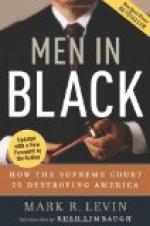The fact of the matter is the judge is a pretty decent sort of person. The trouble is that the surroundings are all against him. In the first place his whole job is one that makes him live up to a part. For five or six hours a day he has to sit still in a stuffy court-room on a leather chair under a silly canopy of wood or plush and pretend that he is the whole thing, that he knows it all, and that whatever he decides is absolutely right. Let him waiver or be uncertain in his decisions and woe is it to him. No one thinks much of a judge who does not know his business or at least does not pretend to know it.
How anyone who has been long on the bench can retain any sense of proportion is remarkable. Whatever he says and does in court is final and apparently approved. If his decisions are reversed they do not affect him seriously; he has tried so many cases that were not appealed, and the greater proportion of those that have been are affirmed. The reversal comes a long time after and does not hurt his feelings. In any event, he was trying to do the best he could and human nature may be fallible, although, as far as he can see, the whole world of the little court-room where he sits has conspired to show him that he is divinely endowed.
His position is not exactly one of bluff, but he is the central figure of the stage; like the actor’s profession the judge’s job makes him an egotist. Take for example the essential elements of his knowledge of the law. He is the Jus Dicens, the one saying the law, the name of judge being derived from the two Latin words. He is supposed to know the law, at least he ought to know court procedure, and the law of his State thereon by heart. In New York State, for example, the Code of Civil Procedure is five hundred thousand words long. He is bound to take judicial notice without being told of all the statutes of the State Legislature, which are being passed at the rate of six hundred a year.
He is also supposed to know the laws of the United States passed at Washington, and to be thoroughly familiar with the latest decisions of the Supreme Courts of the United States, and those for the past 125 years. He must understand and look as though he knew beforehand any decision of the courts of his own State cited, which are conveniently and neatly printed in 219 New York Court of Appeals Reports, 173 volumes of the Appellate Division Reports, and 96 volumes of the Miscellaneous Reports, to say nothing of the opinions and decisions of other courts that are not printed at all. His knowledge of the law is a fearful and wonderful thing; he must have an oceanic mind.
It is told that one of the leaders of the bar had formerly a young man in his office who with advancing years and reputation was elected to the bench. Before the first of January when he was to take his oath of office, the old employer and friend sent for him. When he arrived he was greeted as follows: “Joe, I’ve sent for you because I wanted to see you before you become a judge. I am very fond of you and I wanted to see you once again as you were, because after you go on the bench you are bound to become a stuffed shirt, for they all do.”




